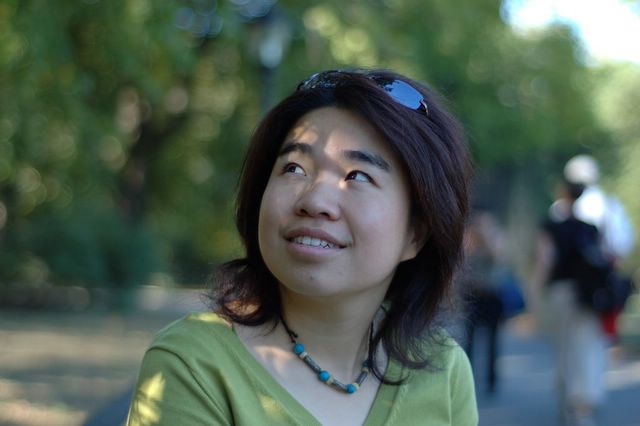
2007年4月21日星期六
晒太阳

2007年4月19日星期四
独自莫凭栏
André Chénier

 Can not sleep. So I finished this film: Dust (2001). According to wikipedia, Dust (Macedonian: Прашина; Transliteration: Prašina) is a 2001 Macedonian film starring Joseph Fiennes, David Wenham, Adrian Lester, Anne Brochet, Nikolina Kujaca, Vera Farmiga and Rosemary Murphy. It was directed and written by Milčo Mančevski. The music was created by Kiril Dzajkovski.
Can not sleep. So I finished this film: Dust (2001). According to wikipedia, Dust (Macedonian: Прашина; Transliteration: Prašina) is a 2001 Macedonian film starring Joseph Fiennes, David Wenham, Adrian Lester, Anne Brochet, Nikolina Kujaca, Vera Farmiga and Rosemary Murphy. It was directed and written by Milčo Mančevski. The music was created by Kiril Dzajkovski.2007年4月17日星期二
Laugh of the day--happiness promised
Use Poetry to dry our tear
Life is unpredictable
Terrible Crime against CU Grad Student near my home
PERVERT TRIED TO KILL HER TIED-UP COLUMBIA STUDENT LEFT TO DIE USED FIRE SET BY CREEP TO FREE HERSELF
BY JIMMY VIELKIND, LISA L. COLANGELO and MELISSA GRACE DAILY NEWS WRITERS
Posted Monday, April 16th 2007, 4:00 AM
Tied up and left to die in a burning apartment, a Columbia student used the blaze set by her sadistic rapist to free herself, Police Commissioner Raymond Kelly said yesterday. "It appears she was able to escape as a result of the fire," Kelly said. "She was tied, and the flame was used by her to break the bond." The 23-year-old woman, identified by sources as a student at the Columbia Graduate School of Journalism, endured 19 hours of rape and torture at the hands of a sick creep in her Hamilton Heights apartment Friday night. In what Kelly called a "particularly vicious" assault, the fiend tied his victim to a bed, cut her, raped her, burned her with scalding water and chemicals - and then set the woman's futon on fire to cover up the crime, police said. He was so brutal he slit her eyelids, Kelly said. The student used the flames to free herself and fled her fifth-floor apartment with her hands still bound to each other to get help from a neighbor, officials said. The woman remains hospitalized in serious but stable condition. Cops yesterday were combing through surveillance video for images of the attacker, who followed the woman into her building near City College at 9:30 p.m. Kelly said detectives were looking to see if there was any evidence the rapist had attacked before, but said, "It does not appear right now to be part of a pattern." One man said he saw the victim in the basement of the building shortly after she escaped. "She just kept saying, 'I've been raped,' " said Ronald Ward, 19, who spotted the fire and ran downstairs for help, where he found the building's superintendent, Carl Peroune, trying to soothe the woman as they waited for an ambulance. "She was down there crying," Ward said. Police were hunting for the attacker, described as a bald, 6-foot-1, 180-pound black man in his 30s with a goatee and a scar on his abdomen. Several residents of the woman's six-story Hamilton Terrace building, located on a quiet treelined block of neat rowhouses, said she had moved in within the last two months. "I've been living in this building 30 years, and nothing like this ever happened," said another resident, Teddy Perkins, 55. "This is real shocking." mgrace@nydailynews.com With Ernie Naspretto
生命,到底谁该对你负责?
妈妈的生日
2007年4月16日星期一
Virginia Tech Shooting Kills at Least 33
April 16, 2007 Virginia Tech Shooting Kills at Least 33 By CHRISTINE HAUSER and ANAHAD O’CONNOR
At least 33 people were killed today on the campus of Virginia Tech in what appears to be the deadliest shooting rampage in American history, according to federal law-enforcement officials. Many of the victims were students shot in a dorm and a classroom building. "Today the university was struck with a tragedy that we consider of monumental proportions," said the university's president, Charles Steger. Witnesses described scenes of mass chaos and unimaginable horror as some students were lined up against a wall and shot. Others jumped out of windows to escape, or crouched on floors to take cover. There were two shootings on the campus in Blacksburg, Va., and in both instances there were fatalities with "multiple shooting victims," Mr. Steger said. The attacks started early in the morning, with a call to police at 7:15 a.m., as students were getting ready for classes or were on their way there. As the rampage unfolded over nearly three hours, details emerged from witnesses describing a gunman going room to room in a residence hall, and of gunfire later at a building where classes were held. When it was over, sidewalks were stained with blood. Among those dead was the gunman. The identification of the gunman was proving difficult, because the suspected shooter did not have identification among his effects and because of the severity of an apparently self-inflicted wound to the head, according to a federal law enforcement official. He said investigators were trying to trace purchase records for two handguns found near the body. At least 22 people were injured. At least 17 Virginia Tech students were being treated for gunshot wounds and other injuries at Montgomery Regional Hospital, and four of them were in surgery, according to a hospital spokesperson. At Lewis-Gale Medical Center, in Salem, Va., four students and a staff member were treated. Two were in stable condition, and the conditions of the other three were described as "undetermined." Officials said there could have been more injured and taken to other medical facilities. The university has more than 25,000 full-time students on a campus that is spread over 2,600 acres. It was not clear how many of the victims were notified of the dangers. Kirsten Bernhards, 18, said she and countless other students had no idea that a shooting had occurred when she left her dorm room in O'Shaughnessy Hall shortly before 10 a.m., more than two hours after the first shootings. "I was leaving for my 10:10 film class," she said. "I had just locked the door and my neighbor said, 'did you check your email?'" The university had, a few minutes earlier, sent out a bulletin warning students about an apparent shooter. But few students seemed to have any sense of urgency. Ms. Bernards said she walked toward her class, preoccupied with an upcoming exam and listening to music on her IPOD. On the way, she said, she heard some loud cracks, and only later concluded they had been gunshots from the second round of shootings. But even at that point, many students were walking around the campus with little if any sense of alarm. It was only when Ms. Bernhards got close to Norris Hall, the second of two buildings where the shootings took place, that she realized something had gone wrong. "I looked up and I saw at least 10 guards with assault rifles aiming at the main entrance of Norris," she recalled. Up until today, the deadliest campus shooting in United States history was in 1966 at the University of Texas, where Charles Whitman climbed to the 28th-floor observation deck of a clock tower and opened fire, killing 16 people before he was gunned down by police. In the Columbine High attack in 1999, two teenagers killed 12 fellow students and a teacher before killing themselves. A police official at Virginia Tech, Wendell Flinchum, said some of the victims were shot in the classroom. News of the number of the fatalities sent up an audible gasp in the news conference, said one television reporter in the broadcast. While few confirmed details about the gunman and the motive were clear, students told reporters at WTKR, a local television station, that the gunman had been looking for his girlfriend, and at one of the locations he lined up some students and shot them all, according to Mike Mather, a reporter for the station. President Bush offered condolences this afternoon to relatives of the victims, and said federal investigators would help the Virginia authorities in any way possible. "We hold the victims in our hearts; we lift them up in our prayers," Mr. Bush said at the White House. President Bush was "horrified" at the news of the shooting, said Dana Perino, a White House spokeswoman, earlier in the day. One student captured partial images, broadcast on CNN, using his cellphone video camera showing grainy dark-clad figures on the street outside of campus buildings. Popping sounds from the gunfire were audible. "This place is in a state of panic," said a student who was interviewed on CNN, Shaver Deyerle. "Nobody knew what was going on at first." He said that the shooting reminded him of the Columbine High School killings. Today's shooting at Virginia Tech comes in the same week, eight years ago, as the April 20 shooting at Columbine. The police were slowly evacuating students from campus buildings and all classes have been canceled. Families were told to reunite with students at the Inn at Virginia Tech, a facility of conference space and hotel rooms. The university community was told to assemble on Tuesday at the Cassell Coliseum to start to deal with the tragedy, a campus statement said. A few details emerged from the news conference. At 7:15 a.m., an emergency 911 call came in to University police department about a shooting at the dormitory, West Ambler Johnston, which houses about 900 freshman students. About two hours later it was followed by a second shooting at a classroom in a science and engineering building on the opposite end of campus, Norris Hall. The shooter died there, the police said. Images on CNN showed police with assault rifles swarming several buildings, sirens blaring in the background and a voice over a loudspeaker warning people across the campus to take cover in buildings and stay away from windows. Many students could be seen crouching on floors in classrooms and dormitories. Police evacuated students and faculty, many of them to local hotels, and witnesses said that some students were seen scrambling out of windows to get to safety. A Montgomery County school official said that all schools throughout the county were being shut down. The shooting was the second in the past year that forced officials to lock down the campus. In August of 2006, an escaped jail inmate shot and killed a deputy sheriff and an unarmed security guard at a nearby hospital before the police caught him in the woods near the university. The capture ended a manhunt that led to the cancellation of the first day of classes at Virginia Tech and shut down most businesses and municipal buildings in Blacksburg. The accused gunman, William Morva, is facing capital murder charges.
2007年4月15日星期日
赖小子(Walking on the Wild Side)

西川的谢幕
前两天在朋友的朋友家做客。芝加哥拥有美丽而安静的郊区,在那里高尔夫球场和大大小小的池塘夹杂在中产阶级的别墅中间,偶尔也可以看到几百万美元的豪宅。哈哈,生活在这里的人每天“绿水青山带笑颜,夫妻双双把家还”。原来生活还可以这样惬意,这样舒服的没谱。朋友夫妇招待得非常殷勤,弄得我都不好意思了。原定第二天一早离开,但是机票出了问题,芝加哥下起了四月的大雪,无论如何是走不了了,只能再叨扰一天。朋友怕我无聊,就搬出一堆书来,让我映雪读书,加上红袖添香的招待。随便挑了一本书开始读,是西川的《深浅》。这一阵子认识了不少原来毕业于北京外国语学院外语学校的老“附校生”,中间又有不少北大的校友,聊起来格外亲切。我打扰的这个朋友在附校就是西川的师兄,后来在北大也是他的师兄。这么多年来他们还保持着联系,这本书就是西川的赠书。
在北大混了六年,多少听说过西川、海子、驼一禾这些名字,但是从来没有真正读过他们的作品。社会学系的系歌唱到“未名湖是个海洋,诗人都沉在水底”,我以为北大的诗人都已经自戕了,没想到西川还在中央美院好好地教书和写诗。这一本《深浅》是他最近的合集,收录了1990年以后创作的作品,“其内容包括西川诗歌精粹、文化随笔,以及与若干国内外作家、学者关于当代中国社会文化的热点问题的对话和争辩。全书由六辑构成。第一、二辑为诗歌,收录了《致敬》、《厄运》、《鹰的话语》、《蚊子志》、《契丹面具》等著名篇章。第三辑为一部具有诗歌特有的韵律美的、想象丰富奇特的诗剧《我的天》。第四辑为散文集,余下两辑为论文,对话,答记者问等等”。
我这个人既是文盲,更是诗盲,所以跳过了诗和戏剧的部分,直接开始读西川的散文。散文中间影响比较深的是西川回顾自己“淘书”生涯的一篇文字(《与书籍有关》),诙谐幽默,半文半白,把淘书和读书的甘苦描摹得淋漓尽致,不愧是个海王屯里的作家。他通过写书来忆人,有的是他的同学和朋友(比如申铭和《太平广记》),有的是旅途中遇到的奇人(比如《爱欲经》和Lance Dane)。最感人的回忆是那段得到阿赫玛托娃的《安魂曲》的经历。他青年时代的诗友老金落魄巴黎,从跳蚤市场淘得此书,不远万里托人带回北京相赠。后来老金过世,西川写下了这段文字“校友说他最后一次见老金是在巴黎沙特赖地铁车站。时老金失魂落魄,精神崩溃。我曾长久徘徊于沙特赖地铁车站站台,冀老金或老金幽魂拍打我肩,但不是生死两茫茫就是生生两茫茫。一个朋友,就这么没了。回到旅馆,我不禁伏枕一哭。在《安魂曲》中,阿赫玛托娃说道:"我知道人的脸怎样憔 悴,/恐惧怎样从眼睑下窥视,/痛苦怎样在脸颊上刻绘/一页页 无情的楔形文字……”。我觉得西川不仅是在向老金作别,也是在向逝去的诗的年代作别。
另一篇《想象我居住的城市》非常有趣。他描写北京,不是把它作为自己当下居住的城市,而是作为想象中的异乡,因此而获得了巨大的想象空间。他引用了不少外国人写北京的作品,比如谢阁兰的小说《勒内·莱斯》,来呼应Coehle的《炼金术士》,以想象来重构现实。他写道“因此,北京的确存在着另一个北京,是老舍那类人所不曾见过的,就像这世界上存在着老舍不曾见过的生活、不曾读过的诗篇。日常生活的北京还不是全部的北京。你需要想象北京,北京会满足你的想象;即使它暂时没有你所想象的东西,它也会应着你的想象长出你所想象的东西。我们都从想象中来。”我尤其喜欢他下面的一段文字:
“你看,我想象我居住的城市,一半是出于主动,一半是出于被迫。除了市中心那栖居着幽灵的九千九百九十九间半空屋以及那有着历史走向的皇家大道,一个旧北京基本上已经被一个新北京所替代。我并不怀念那个旧北京,因为我从未见过那个旧北京;而那些钢筋水泥的新骨董,根本无法唤起我回到旧北京的感觉。我只是在回味"北京"这个专有名词时,会幽幽然获得一种历史的纵深感,我因此而领会想象的乐趣,我因此思索我的天命所在。北京,一个词汇,除了它的方位所指没有大的改变,它的政治所指、经济所指、文化所指,乃至道德所指均已大不同于从前。我从北京的名与实之间看出了距离。而名与实,或称词与物之间的距离,恰恰是想象的巨大空间。名与实,或词与物,永远只能有瞬间的叠合。那叠合的一刹那,便是创造的一刹那,其余时间,名与实的距离越拉越大,这对想象的好处也越来越大,直到它们之间再也无法维持对称的关系,于是想象的琴弦绷断。”
西川在文中几次提到海子的死、驮一禾的死、戈麦的死和张风华的死,在《生命的故事》中,他回忆了那些不合时宜的朋友和他们的不合时宜的生存年代,以及他们所选择的“义人之路”。在他深深的惋惜之情背后,我似乎感觉到一点点的不安,甚至嫉妒。朋友们死了,正是由于他们悲剧性的死亡和对他们死亡的浪漫渲染(西川本人出力不少),使得他们成了诗歌界的“神灵”,成了不折不扣地精神领袖和偶像。提到海子他们,每个人都感到自惭形秽。我们不具有他们那样的才华去写诗,也缺乏他们那样的勇气去死亡。他们变成了神,因为他们见证了八十年代和那个时代的精神,且身体力行地把对后来世界的失望转化成了极为暴烈的死亡形式。他们在极之年轻的时候选择了死亡,故而他们流传下来的作品都是他们盛年时代最好的作品,因为他们还没来得及写一些次等的作品。一个人写100首诗,根据概率论,至少有五首不怎么样。但是如果你只来得及写了30首,那么说不定字字珠玑,而且别人会想象其他的70首也是传世之作。年轻的诗人们死了,因此他们不用随着年龄的增长而与这个丑陋的世界妥协,他们不用变成萎缩的中年人和无力的老年人。他们的诗就是青春的本身,带着青春所有的锐气和灵感,带着所向披靡的勇气和无畏,完全没有年齿日长所带来的畏惧和彷徨,没有生活压力之下的妥协和沉沦。从这个意义上说,这些死去的年轻诗人是幸运的 — 尼采在《悲剧的诞生》里不是说过,这个世界上最大的幸运就是不必出生,或者尽早死去么?
西川没有这么幸运,他变成了一个衰老的偶像。他的诗非常“理性”,或者说非常的“辛弃疾化”。他不停地掉书袋子,不断地把古往今来的知识分子和文学人物引到书里来,一方面的确有利于意向的展开和情绪的铺展,但是另一方面却给阅读带来巨大的困难。如果你不是像西川一样博学,如果你不像他一样博览群书、走遍世界,那么面对一大堆陌生的人名和地名,你所看到的不过是大量的没有所指的名词而已,这些诗歌对你不会产生任何意义。西川的诗是少数人的诗歌,他不断地提炼自己的技巧,使得他的机构无懈可击,用词完美无瑕,但是他生产出来的是汝窑的精品,不是老百姓也能享用的青花。当然,诗歌从来不是也不应该是“人人的诗歌”,“凡有水井处,人人皆歌柳词”不过是夸张而已。但是,作为一个衰老的偶像,西川是不是在用《深浅》来向诗坛告别?或者他是在委婉地为自己的青年时代谢幕?
偶像如何在自己的黄昏时代自处是一个严肃的问题。因为他不仅要面对世事的变幻,年轻诗人的竞争,而且要挑战年轻时代的自己。弥尔顿提出了对这个问题最好的回答。他在政治失意和失明之后,完成了自己的《失乐园》、《复乐园》和《巨人参孙》三部曲,开创了撒旦诗篇的传统。弥尔顿成名极早,是个少年天才诗人。他的成年时代花费在政治斗争当中,直到晚年才回到文学创作中来。在《失乐园》中,我们看到的不是一个老年诗人对岁月的留恋,而是充满了力量和反叛精神的精神领袖撒旦,他以十倍、百倍的精神挑战自己的命运。但是几千年的文学史中,不就是一个弥尔顿吗?
最近几天网上在纪念王小波逝世十周年,褒贬不一,但是多数文章是在“造神”。中国人似乎有一个倾向,总是借死者说事儿。一个时代有一个时代的偶像,(虽然有的时代出现的是愚蠢的偶像,比如现在),王小波是90年代的偶像,现在我们纪念他到底是什么意思?我觉得以制造偶像的方式来纪念王小波是非常危险的,这种脱离语境、脱离时代环境的无限拔高和过去使用意识形态来制造偶像如出一辙。现在像吹捧韩寒一样来吹捧王小波只有一个后果,就是使他更快的被人忘记。现在的偶像所拥有的是安迪.沃霍意义上的成名,即“everyone should have five minutes of celebrity time”。从这个角度来看,如果王小波活着,他一定会看出这场造神运动的荒谬,而且会拒绝参与其中。我觉得对他最好的纪念,是以他的姿态来思考。我有一个大胆的想象,假如王二还活着,而且变成了一个五十多岁的中老年作家,这十年中他会写出怎样的文字?毕竟他的《黄金时代》已经过去了,他所倡导和代表的新自由主义精神已经得到了社会的普遍认可,他所反对的专制意识形态已经在强大的消费文化冲击下衰退了。在假想敌消失的时候,一个愤怒的小说家应该何为?他会寻找新的值得愤怒的理由,还是取消自己愤怒的姿态,或者开始像西川一样沉湎在回忆中过活?



































